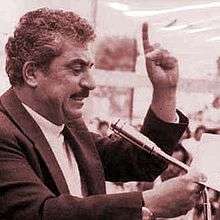Tawfiq Ziad
Tawfiq Ziad (Arabic: توفيق زيّاد, Hebrew: תאופיק זיאד, also spelt Tawfik Zayyad or Tawfeeq Ziad, 7 May 1929 – 5 July 1994) was a Palestinian politician well known for his "poetry of protest".[1]
| Tawfiq Ziad | |
|---|---|
 | |
| Date of birth | 7 May 1929 |
| Place of birth | Nazareth, Mandatory Palestine |
| Date of death | 5 July 1994 (aged 65) |
| Place of death | Jordan Valley, West Bank |
| Knessets | 8, 9, 10, 11, 12, 13 |
| Faction represented in Knesset | |
| 1973–1977 | Rakah |
| 1977–1990 | Hadash |
| 1992–1994 | Hadash |
Biography
Born in Nazareth, Ziad was active in communist circles since his youth. He was elected as a member of the Nazareth municipality in 1954. Under the Israeli military rule (1948-1966) he was arrested and imprisoned several times, and in 1955 he was tortured in the Tiberias prison.[2]. Between 1962 and 1964 he was educated at the Higher Party School in Moscow.[3]
After returning home, he was elected mayor of Nazareth on 9 December 1975, as the leader of the Democratic Front of Nazareth, a victory that is said to have "surprised and alarmed" Israelis.[4]
Elected to the Knesset in the 1973 elections on Rakah's list, Ziad was active in pressuring the Israeli government to change its policies towards Arabs - both those inside Israel and in the occupied Palestinian territories. A report he co-authored on Israeli prison conditions and the use of torture on Palestinian inmates was reprinted in the Israeli newspaper Al HaMishmar. It was also submitted to the United Nations by Tawfik Toubi and Ziad after their visit to Al-Far'ah prison on 29 October 1987. It was subsequently quoted from at length in a UN General Assembly report dated 23 December 1987, where it was described as "Perhaps the best evidence of the truth of the reports describing the repugnant inhumane conditions endured by Arab prisoners."[5]
Ziad died on 5 July 1994 in a head-on collision in the Jordan Valley on his way back to Nazareth from Jericho after welcoming Yasser Arafat, the chairman of the Palestine Liberation Organization, back from exile.[6] At the time of his sudden death, he was still Mayor of Nazareth, a member of the Knesset and "a leading Arab legislator". A street is named after him in Shefa-'Amr.
Footnotes
- Ben Ze'ev 2011, p. 218
- Sorek, Tamir (2020). The Optimist: A Social Biography of Tawfiq Zayyad. Stanford, CA: Stanford University Press. ISBN 9781503612747., pp. 37-40.
- Sorek, Tamir (2020). The Optimist: A Social Biography of Tawfiq Zayyad. Stanford, CA: Stanford University Press. ISBN 9781503612747., pp. 55-56.
- "Rakah Victory in Nazareth". Journal of Palestine Studies. Spring - Summer, 1976, Vol. 5, No. 3/4: 178–180. JSTOR 2536027. Cite journal requires
|journal=(help); Check date values in:|date=(help) - General Assembly (23 December 1987). "Report of the Special Committee To Investigate Israeli Practices Affecting the Human Rights of the Population of the Occupied Territories". United Nations.
- "Tawfik Ziad, 65, Mayor of Nazareth, Obituary". New York Times. 6 July 1994.
References
- Ben Ze'ev, Efrat (2011), Remembering Palestine in 1948: Beyond National Narratives, Cambridge University Press, ISBN 978-0-521-19447-1
External links
- Tawfiq Ziad home page (in Arabic)
- Tawfiq Ziad on the Knesset website
- Ziad's poetry (in Arabic)
- Tawfiq Ziad; Israel and 'Unadikum' (in English). By Tim King. Salem News, 15 May 2011.